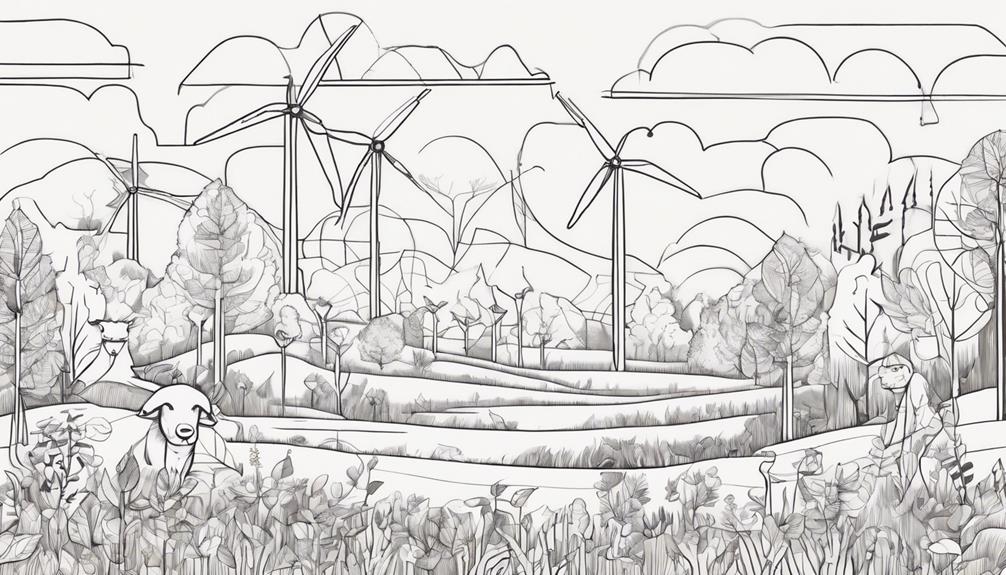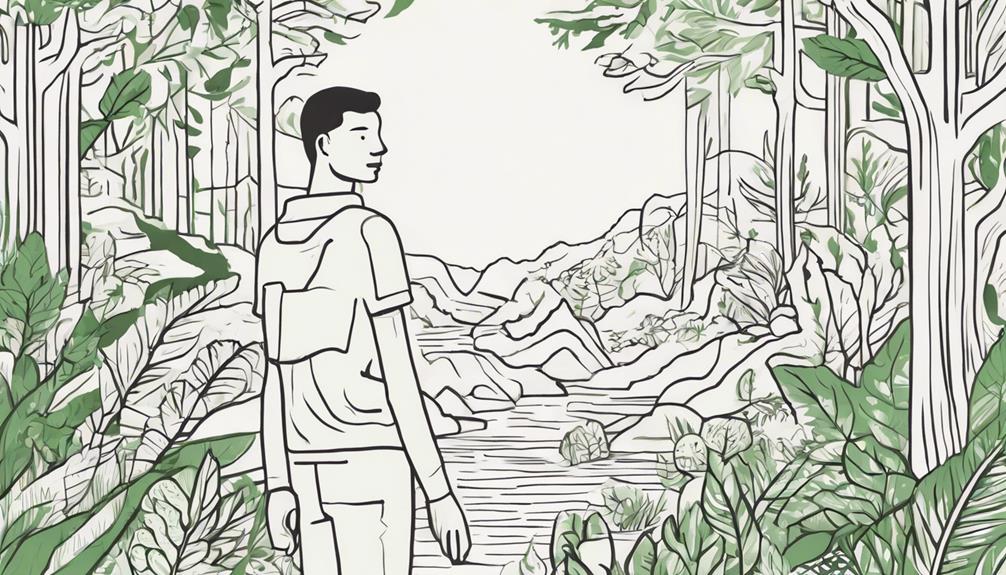Our responsibility towards nature is a fundamental aspect of our existence on this planet. As rational beings, it is imperative that we analyze our role in the intricate web of ecosystems and acknowledge the impact of our actions on the environment. By understanding the scientific principles governing nature and the consequences of our behaviors, we can begin to unravel the complexities of our relationship with the natural world. The ethical and moral implications of our choices towards nature require a thoughtful and reasoned approach to ensure the long-term sustainability of Earth.
Key Takeaways
- Acknowledge our impact on nature and act with responsibility.
- Practice sustainable living to preserve resources for future generations.
- Advocate for ethical principles in interactions with the environment.
- Collaborate globally for effective conservation efforts and environmental harmony.
Humanity's Connection to Nature

Interconnected with all living organisms, humanity maintains an integral relationship with nature, shaping and being shaped by the environment in a complex web of interactions. Our environmental responsibility towards nature stems from this intricate connection. Human activities have profound effects on the environment, influencing ecosystems, biodiversity, and ultimately the planet's health. Recognizing the impact of our actions is crucial in fostering a sustainable coexistence with nature.
Acknowledging our responsibility towards the environment involves understanding the importance of preserving biodiversity and ecosystem services. By safeguarding natural resources and minimizing our ecological footprint, we can contribute to maintaining the delicate balance of nature. Our duty to protect and conserve the environment is not only a moral imperative but also essential for ensuring the well-being of present and future generations.
Cultivating a harmonious relationship with nature not only benefits the environment but also enhances human health and quality of life. By valuing and respecting our interconnectedness with the natural world, we can strive towards a more sustainable and responsible existence.
Ethical Considerations in Environmental Preservation
Ethical considerations in environmental preservation are rooted in the moral duty humans have towards the environment, emphasizing sustainable living practices and the conservation of resources. By acknowledging our responsibility to protect and nurture the natural world, we can ensure the well-being of current and future generations. Embracing ethical principles in our interactions with the environment is crucial for fostering a harmonious relationship between humanity and nature.
Moral Duty to Environment
How can our moral obligations towards the environment drive responsible resource management practices for sustainable use by future generations? Ethical considerations in environmental preservation necessitate a shift towards sustainable practices to ensure the well-being of our planet for generations to come. By acknowledging our moral duty to the environment, we can promote stewardship and respect for nature, fostering interconnectedness with the natural world. This involves advocating for a moral revolution to alter human behavior towards more eco-friendly approaches and embracing a bio-centric perspective that prioritizes the welfare of all living organisms and ecosystems. Our ethical responsibilities towards nature include refraining from actions that impose burdens on future generations and actively engaging in conservation efforts to safeguard environmental sustainability.
Sustainable Living Practices
Sustainable living practices play a crucial role in fostering environmental preservation by emphasizing the minimization of waste, conservation of resources, and reduction of environmental impact.
- Minimizing waste
- Conserving resources
- Reducing environmental impact
These practices not only benefit the environment but also contribute to ethical considerations in environmental protection. By adopting sustainable practices, individuals can support the maintenance of ecological balance, protection of natural habitats, and preservation of biodiversity. This approach helps ensure a healthier planet for future generations by mitigating the negative effects of human activities on the environment. Embracing sustainable living is a vital step towards fulfilling our responsibility to nature and promoting long-term environmental sustainability.
Conservation of Resources
The conservation of resources is a fundamental aspect of responsible environmental stewardship, emphasizing the sustainable management and preservation of natural assets. Ethical considerations in environmental preservation underscore the importance of respecting nature and ensuring that our actions do not impose undue burdens on future generations. Conservation efforts are vital in promoting the interconnectedness of ecosystems, fostering sustainability, and advocating for a bio-centric approach to resource management. To achieve these goals, it is imperative to instigate a moral revolution that transforms human behavior towards nature. Key recommendations for conservation include abiding by environmental laws, maintaining cleanliness, preventing deforestation, and promoting the judicious use of natural resources to ensure their longevity and availability for future generations.
Stewardship Responsibilities in Ecosystem Conservation
Stewardship responsibilities in ecosystem conservation encompass implementing effective ecosystem protection techniques, evaluating the role of human impact on ecosystems, and emphasizing the importance of conservation efforts. Understanding the interconnectedness of ecosystems guides responsible resource management practices, ensuring sustainability and ecological balance. By advocating for a bio-centric approach, a moral revolution can transform human behavior towards respectful and sustainable interactions with nature.
Ecosystem Protection Techniques
In the realm of ecosystem conservation, a fundamental focus lies on the implementation of effective techniques to protect biodiversity, habitats, and ecosystems.
- Habitat Restoration: Restoring degraded habitats to their natural state to support diverse species.
- Sustainable Resource Management: Managing resources in a way that meets current needs without compromising future generations.
- Pollution Control: Implementing measures to reduce pollution levels and minimize harmful impacts on ecosystems.
These ecosystem protection techniques play a crucial role in safeguarding the environment, promoting species diversity, and maintaining the delicate balance within ecosystems. By actively engaging in practices such as habitat restoration, sustainable resource management, and pollution control, individuals and organizations contribute to the health and resilience of ecosystems worldwide.
Role of Human Impact
Demonstrating a clear understanding of the interconnectedness between human activities and ecosystem health is paramount in fostering responsible stewardship in ecosystem conservation efforts. Human actions play a significant role in shaping the health and sustainability of ecosystems. Factors such as deforestation, pollution, and overexploitation of resources directly impact biodiversity and contribute to climate change. Ethical decision-making is crucial in mitigating these negative effects and promoting ecosystem resilience. By adopting sustainable practices and showing respect for nature, individuals can fulfill their stewardship responsibilities towards ecosystem conservation. Recognizing the delicate balance between human activities and ecological well-being underscores the importance of making informed choices to preserve habitats, protect biodiversity, and ensure the availability of natural resources for future generations.
Conservation Efforts Importance
The critical importance of conservation efforts in safeguarding ecosystem balance and biodiversity cannot be overstated.
- Conservation activities aim to mitigate the impacts of climate change on natural habitats.
- Sustainable practices ensure the long-term viability of ecosystems.
- Responsible stewardship involves promoting ethical behavior towards the environment.
Conservation efforts play a vital role in addressing the challenges posed by climate change and unsustainable practices. By actively protecting and preserving natural habitats, stewardship responsibilities contribute to the overall health and resilience of ecosystems. Emphasizing sustainable resource management not only benefits current generations but also ensures that resources are available for future needs. Advocating for conservation and sustainable practices fosters a sense of interconnectedness with nature, promoting a harmonious coexistence between humans and the environment.
Impact of Human Activities on Natural Systems
Human activities have a significant impact on natural systems, causing detrimental effects such as acid rain, eutrophication, and ozone depletion. These consequences stem from various sources, including industrial processes and transportation emissions. The pollutants released into the atmosphere not only harm the environment but also pose risks to public health. For instance, acid rain, a byproduct of sulfuric and nitric acids from industrial activities, damages ecosystems and aquatic life. Additionally, emissions like sulfur dioxide and nitrogen oxide from vehicles contribute to air pollution, affecting air quality and human respiratory health. Furthermore, the depletion of the ozone layer due to human-made chemicals exacerbates global climate change, leading to adverse effects on the planet's ecosystems and weather patterns. Understanding these impacts is crucial in promoting sustainable practices and mitigating the long-term consequences of human activities on the environment and public well-being.
| Impact | Source | Consequence |
|---|---|---|
| Acid Rain | Industrial emissions | Harm to ecosystems and aquatic life |
| Air Pollution | Vehicle emissions | Respiratory health risks |
| Ozone Depletion | Human-made chemicals | Exacerbates global climate change |
Promoting Sustainable Practices for Future Generations

With the evident impacts of human activities on natural systems well understood, the imperative now lies in fostering sustainable practices that safeguard ecosystems for the benefit of future generations. Embracing sustainable development principles is crucial for ensuring the well-being of our planet in the long run. Here are key points to consider:
- Sustainable practices like stewardship and conservation promote responsible resource management.
- Future generations stand to benefit from our efforts to respect nature and minimize environmental damage.
- Sustainable resource use and bio-centric approaches play a vital role in achieving environmental sustainability.
Addressing Challenges in Biodiversity Protection
In the realm of environmental conservation, the pressing need to address challenges in biodiversity protection remains a critical focal point for global sustainability efforts. Biodiversity protection encompasses the preservation of various life forms on Earth, such as plants, animals, and microorganisms. The loss of biodiversity poses significant threats to ecosystem stability, food security, and human well-being. Human activities, including deforestation, pollution, and the overarching issue of climate change, contribute substantially to the ongoing decline in biodiversity. Climate change, driven primarily by global warming, exacerbates the challenges faced in biodiversity protection by altering habitats and disrupting ecosystems worldwide.
Efforts aimed at conserving biodiversity seek to safeguard habitats, species, and genetic diversity for the benefit of present and future generations. International agreements and conservation programs play pivotal roles in addressing these challenges and promoting biodiversity protection on a global scale. By acknowledging the intricate connections between biodiversity, climate change, and human activities, we can work towards establishing sustainable practices that support the preservation of Earth's rich tapestry of life forms.
Advocating for Nature's Rights and Well-being

Continuing the discourse on environmental conservation, the advocacy for nature's rights and well-being necessitates a fundamental shift towards recognizing the intrinsic value of nature beyond human utility. This shift is crucial in addressing the challenges posed by climate change, which directly impacts the well-being of our ecosystems.
Key Points:
- Legal Protection: Implementing legal frameworks that safeguard habitats, species, and natural resources is essential for advocating nature's rights.
- Sustainable Practices: Embracing sustainable practices is vital for ensuring nature's well-being, as they help maintain ecological balance and biodiversity.
- Ethical Considerations: Advocating for nature's rights aligns with ethical considerations that value the interconnectedness of all living beings, fostering a more harmonious relationship between humans and the environment.
Collaborative Efforts for Global Environmental Harmony
Efforts towards fostering global environmental harmony through collaborative endeavors are imperative in addressing pressing sustainability challenges on a worldwide scale. In the face of escalating global climate concerns, international cooperation is essential for the advancement of renewable energy technologies and sustainable practices. By pooling resources and expertise, nations can work together to mitigate the impact of climate change, promote the adoption of renewable energy sources, and collectively strive towards a more sustainable future. Sharing knowledge and best practices on a global scale can lead to the development of innovative solutions that benefit both the environment and society as a whole. Collaborative initiatives not only facilitate the conservation of natural resources but also foster a sense of collective responsibility towards protecting the environment for future generations. Through partnerships and alliances focused on environmental conservation and sustainable development, nations can make significant strides towards achieving global environmental harmony and ensuring a healthier planet for all.
Frequently Asked Questions
What Is Our Responsibilities Towards Nature?
Conservation efforts and sustainable living practices are essential in fulfilling our responsibilities towards nature. Biodiversity preservation and ecosystem restoration are paramount for maintaining ecological balance. By adhering to these principles, we can contribute to the long-term health of our planet. Embracing a bio-centric perspective and respecting laws that protect the environment are crucial steps in ensuring a harmonious relationship with nature. Our actions today shape the world we leave for future generations.
What Are the Responsibilities of Humans Towards the Environment?
As stewards of the environment, humans bear the responsibility of preserving ecosystems and reducing pollution. This entails implementing sustainable practices, conserving natural resources, and minimizing harmful impacts on biodiversity. By engaging in responsible resource management and fostering awareness of environmental issues, individuals can contribute to the protection of ecosystems and promote a healthier planet for current and future generations.
Why Are We Responsible for Nature?
Environmental stewardship is an ethical obligation rooted in our interconnectedness with nature. Our responsibility towards nature is underscored by the need for conservation efforts and sustainable practices. Understanding the impact of human actions on the environment highlights the necessity for responsible resource management. Embracing this duty fosters a bio-centric approach that promotes environmental sustainability and mitigates ecological harm. Thus, advocating for a moral revolution can guide us towards more eco-friendly practices.
Do We Have a Responsibility to the Environment?
Environmental preservation is an ethical obligation we hold. Our responsibility to the environment is undeniable. Sustainable living practices and reducing our ecological footprint are imperative for the well-being of our planet. By recognizing the interconnectedness of all living beings and ecosystems, we acknowledge our duty to protect and conserve nature. Embracing this responsibility ensures a healthier and more sustainable future for generations to come.
Conclusion
In conclusion, as inhabitants of this planet, it is imperative that we recognize our role as stewards of nature. Our responsibility towards the environment is akin to tending to a delicate garden, where every action we take can either nurture or harm the delicate balance of life. By embracing sustainable practices, advocating for biodiversity protection, and working together globally, we can ensure the well-being of our planet for generations to come.
